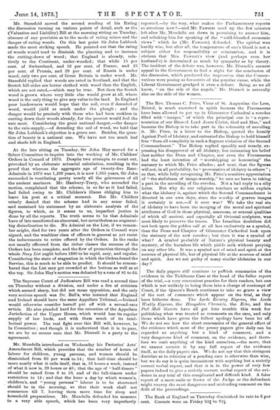At the late sitting on Tuesday, Sir John Hay moved
for a 'Select Committee to inquire into the working of Mr. Childers' Orders in Council of 1870. Despite two attempts to count out, provoked by an elaborate actuarial calculation, resulting in the proof that whereas the aggregate age of twenty-five Rear- Admirals in 1870 was 1,299 years, it is now 1,365 years, Sir John succeeded in ventilating pretty nearly all the grievances of all the ancient mariners. Mr. Elanbury-Tracy, who seconded the motion, complained that the scheme, in so far as it had failed, had failed owing to Mr. Chllders's illness obliging him to leave his post at a critical moment. But Mr. Childers -utterly denied that the scheme had in any sense failed, and sustained his statement by an elaborate analysis of the 'figures, to which, as it seems to us, imperfect justice is done by all the reports. The truth seems to be that Admirals have of late manifested an abnormal, but nevertheless an augment- ing disinclination to die. No Admiral on the List, if we remem- ber aright, died for two years after the Orders in Council were 'signed, and the wealthier class of officers in general as yet resist the inducements to retire offered by the Orders. In the ranks not usually officered from the richer classes the success of the Orders has been complete, and the flow of promotion through the whole Navy List ought before 1880 to be rapid, easy, and regular. Considering the state of stagnation in which the Orders found the Service, this is much to be able to predict. It should be remem- bered that the List may get crowded at the bottom as well as at the top. Sir John Hay's motion was defeated by a vote of 81 to 64.


































 Previous page
Previous page